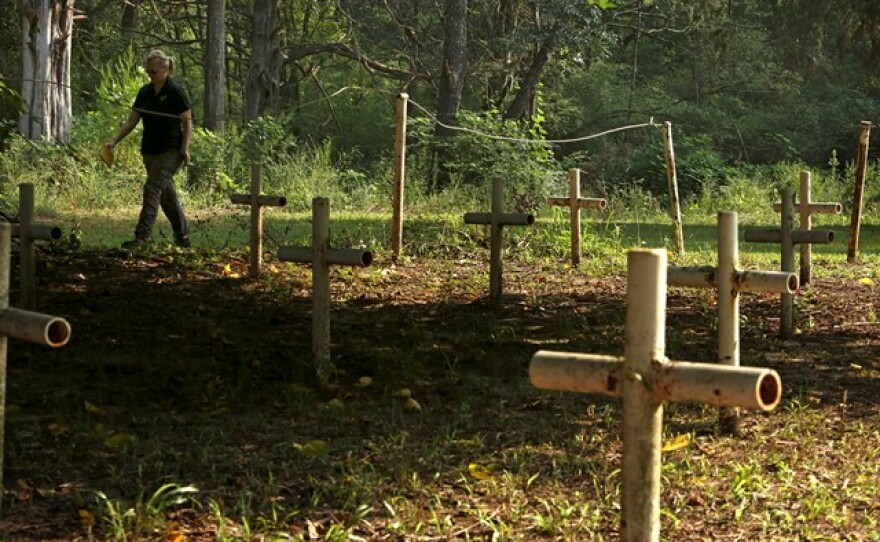University of South Florida researchers began work to exhume dozens of graves Saturday at a former Panhandle reform school in hopes of identifying the boys buried there and learning how they died.
USF spokeswoman Lara Wade said in a message Saturday that the work had begun, with researcher measuring and marking the site. Researchers then will remove dirt with trowels and by hand to find the remains, which are believed to be 19 inches to 3-plus feet under the surface.
"In these historic cases, it's really about having an accurate record and finding out what happened and knowing the truth about what happened," said Erin Kimmerle, a USF anthropologist who is leading the excavation.
Former inmates at the reform school from the 1950s and 1960s have detailed horrific beatings that took place in a small, white concrete block building at the facility. A group of survivors call themselves the "White House Boys" and five years ago called for an investigation into the graves. In 2010, the Florida Department of Law Enforcement ended an investigation and said it could not substantiate or refute claims that boys died at the hands of staff.
USF later began its own research and discovered more graves than the state department had identified. USF has worked for months to secure a permit to exhume the remains, finally receiving permission from Gov. Rick Scott and the state Cabinet after being rejected by Secretary of State Ken Detzner, who reports to Scott.
Robert Straley, a spokesman for the White House Boys, said the school segregated white and black inmates and that the remains are located where black inmates were held. He suspects there is another white cemetery that hasn't been discovered.
"I think that there are at least 100 more bodies up there," he said. "At some point they are going to find more bodies, I'm dead certain of that. There has to be a white graveyard on the white side."
Among those that have pushed to allow USF to conduct the research are Republican Attorney General Pam Bondi and Democratic U.S. Sen. Bill Nelson.
"My goal all along has been to help bring closure to the families who lost loved ones at Dozier. I feel great relief that the work to identify human remains is now underway," Bondi said through a spokeswoman.
USF will work at the site until Tuesday and hopes to unearth the remains of two to four boys before resuming the excavation at a later date, Kimmerle said. The initial work will ensure that the process works smoothly before researchers return to the site.
DNA obtained at the site will be sent to the University of North Texas Center for Human Identification for analysis. The hope is that it can be matched to relatives. Ten families have contacted researchers in hopes of identifying relatives that might be buried at Dozier.
If matches are found, remains will be returned to the families.
"They want to bury them in family plots and next to the boys' mothers and things like that," Kimmerle said. "Anyone whose remains are unidentified will be re-interned here at Boot Hill."
Any remains that are reinterned will have a grave marker and their DNA will be recorded in case anyone other families seek to identify remains.
"Hopefully a lot of questions will soon be answered once the scientists finish unearthing these unmarked graves in 'Boot Hill Cemetery,' " Nelson spokesman Dan McLaughlin wrote in an email.














